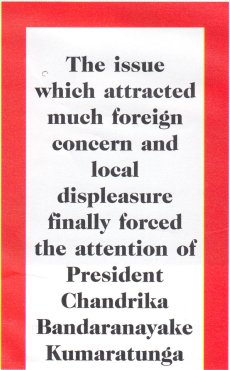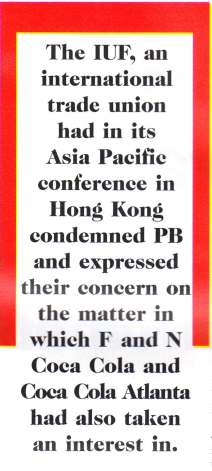A 3 Month strike launched by the employees of Pure Beverages ended on March after a joint 6th memorandum was signed between the Management of Pure Beverages and the employees. The signatures of 2 PB directors on behalf of the employer and three union members for the employees officially announced the conclusion of a 85 day strike launched by over 700 workers of PB and the commencement of the production and sale of Coca Cola products. The announcement came as a suprise after several rounds of discussions between both parties had continuously failed. The issue which attracted much foreign concern and local displeasure finally forced the attention of President Chandrika Bandaranayake Kumaratunga whose intervention is said to be the key factor in ending the crisis. Both parties eventually decided under conditions to end the strike which caused a severe dearth of CC products in the local market for the past three months. On December 12th 1996, 508 employees of PB who are members of The Ceylon Mercantile Union (CMU) and 60 members of another trade union known as The Food Beverages and Tobacco Industry Employees Union went on strike. On December 17th an additional 298 employees joined the strike taking the total number of strikers to 861. The workers were protesting against the closure of the Kaduwala bottling plant which they claimed was a result of a failed voluntary retirement scheme and the retrenchment of 350 employees of the company. The management of PB stongly reiterated their stand that the Kaduwala factory was no longer financially viable and their decision was in the best interest of the company. Less than two days after the strike commenced Labour Minister Mahinda Rajapakse called on both parties for a meeting in a bid to resolve the matter. However this meeting just like the many others that followed proved to be a complete failure with little consensus reached between the two parties.

Since December 12th PB and the CMU have met the labour commissioner over 10 times. The later meetings to wards February were hardly taking place with either one of the parties boycotting in the knowledge of the inability to break the deadlock. However at this point the issue had attracted much international attention. The IUF, an international trade union had in its Asia Pacific conference in Hong Kong condemned PB and ex- pressed their concern on the matter in which F and N Coca Cola and Coca Cola Atlanta had also taken an interest in. It was at this point that President Chandrika Bandaranaike Kumaratunge intervened calling for a meeting with both parties in a bid to resolve the matter. The President met with a delegation of PB representatives on February 25th, including 2 directors, Ana Punchiheva and Asoka Wickramasinghe.
The following day she met with members of the trade unions continuing her efforts to resolve the matter. In her discussions with the trade unionist President Kumaranatunge urged them to end the strike pointing out that not only were the 800 workers of PB affected by it but she also explained that there were over 12,000 dealers and distributors island wide who were affected by the strike. She also warned the union that the continued strike in Colombo would provoke CC to pull out of the country. The meetings with the President were the only successful discussions held by both parties since the strike was launched and finally there were signs of an end to the crippling strike.
On February 27th the labour commission prepared a draft memorandum which the CMU agreed to sign subject to the condition of approval by PB. The company in response drafted another. memorandum the following day including clauses that were questioned by the employees. Within the same week however the final memorandum was drafted which was agreeable to both parties.
The memorandum was signed by Ana Punchiheva and Asoka Wickramasinghe for PB and Bala Thampoe general sec of the CMU and a member of the FITU, U Karunaratne. Labour Minister Mahinda Rajapakse certified the memorandum. The very same day PB issued a press release saying the strike had ended on the grounds that both parties had commenced negotiations in good faith on the closure of the Kaduwala plant and retrenchment of employees. The same week the company published a notice in a news paper informing distributors and dealers that the strike was over and expressing their gratitude to the President and others involved in resolving the strike on March 6th.
The CMU Gen See spoke to all workers and officials and announced the end of the strike. Each worker was paid a sum of Rs 500 which was donated for the cause by an international trade union belonging to the IUF.

By the second week of March production of PB products had resumed and by the 3rd week Coca Cola, Fanta, Sprite were back on the market after a lapse of three months.
The reccomencement of production at PB was welcomed not only by the company and the employees but also by the business sector investors and members of the general public.
Analysts say that the disruption of work at PB would definitely have incurred heavy financial losses to the company however the recomencement was welcomed by many. The first effects of the resolution were witnessed at the Colombo Stock Exchange where PB shares showed immediate signs of gains.
Despite the euphoria of resolving the strike however it must be remembered that the two key issues that led to the strike namely the closure of the Kaduwala plant and the retrenchment of employees are yet to be discussed. Trade unions have warned that unless the matter is resolved workers might be compelled to strike again. This for the time being at least is not a brewing matter. What matters most at present is that the long standing strike has been resolved and CC products have finally re-entered the market.


